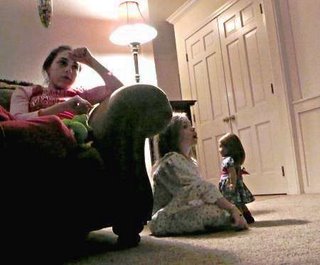The perfect metaphor

Ah, Christmas. Time to visit the strange planet Family, where the television set is always on. Where Christmas dinner is followed by hushed attention to --- a special episode of Deal or No Deal.
I hadn't seen Deal or No Deal before, but it didn't take long to figure out the rules. There's Howie Mandel, once a modestly-famous comic and actor, with a bald head, a tiny beard and one earring, looking a bit as if he were hoping to try out for the Village People. There are about 26 spokesmodel types who stand next to Zero Halliburton aluminum attache cases, each case with a number.
There is a sum of money printed inside each case, ranging from one cent to one million dollars. The contestant starts the game by picking one of the cases. He doesn't get to look inside, but whatever sum is printed in that case is what he will win.
The contestant then calls out the numbers of several cases, and one by one the spokesmodels assigned to hold those particular cases opens them. The obvious point is that the guy isn't going to win a million dollars if it shows up in one of the spokesmodel's cases.
Even with all the dramatic music and lighting that game shows can't do without these days this would still be too lame even for network television, so Deal or No Deal has a twist. A mysterious Banker is said to sit in a booth high above the stage, and he periodically offers a buyout sum--calculated on the basis of the odds that the highest sum not eliminated so far is the one in the contestant's case. The high drama of the show comes as the contestant has to choose between taking the offer or continuing the game: deal or no deal.
This is a quiz show in which all knowledge and skill have been eliminated. But the contestants treat it as something far more than a test of luck. One of them kept announcing prayerfully that this was his time to win; he would not deal, determined to "stick it to the banker." Another insisted that he would win because, "If you believe, you can achieve!"
As irrational as the whole setup is, it seems oddly powerful to those involved. And this may be because the show, intentionally or not, reproduces the way life now appears to most Americans. Things just happen. Nothing is causally linked to anything any more. Achievement is indistinguishable from luck. It's a hostile world, in which an anonymous agent keeps trying to keep you from getting yours. If your faith and self-confidence are strong, though, you will prevail in spite of the odds.
It's a magical world view. In fact, it's far more illogical and absurd than traditional magical world views, which generally incorporate pretty sophisticated ideas of causality. It's the world view of people who can't understand the world or play an active role in it. It's the world of small children or of alcoholics, now on prime time for all to share. Ideological masking can't get much more effective than this. Deal or No Deal is the perfect metaphor for the illusionary world we all live in today.

3 Comments:
this is directed to your Friday, October 27, 2006 entry. in attempts to sound juvenile, "I love you!" i clicked on the link included after the point about buddhism and music? I didn't get the website but hey, if there was contemporary buddhist rock out there, i'd listen to it!
of course you know it, you are a great writer and i added you to my favourites and i will improve my english skills as well as "get more intellectual".
thanks
I've experienced many of these realizations myself. They are true, but they can be unbearable. Are you advocating an embodied escape from dreamland are you sharing these realizations for the sake of some distant hope. My experience tells me the distinction in personal and that once one has been snagged by dreamland, there is no return.
You know you got lurkers, right? Looking forward to your next post.
Post a Comment
<< Home